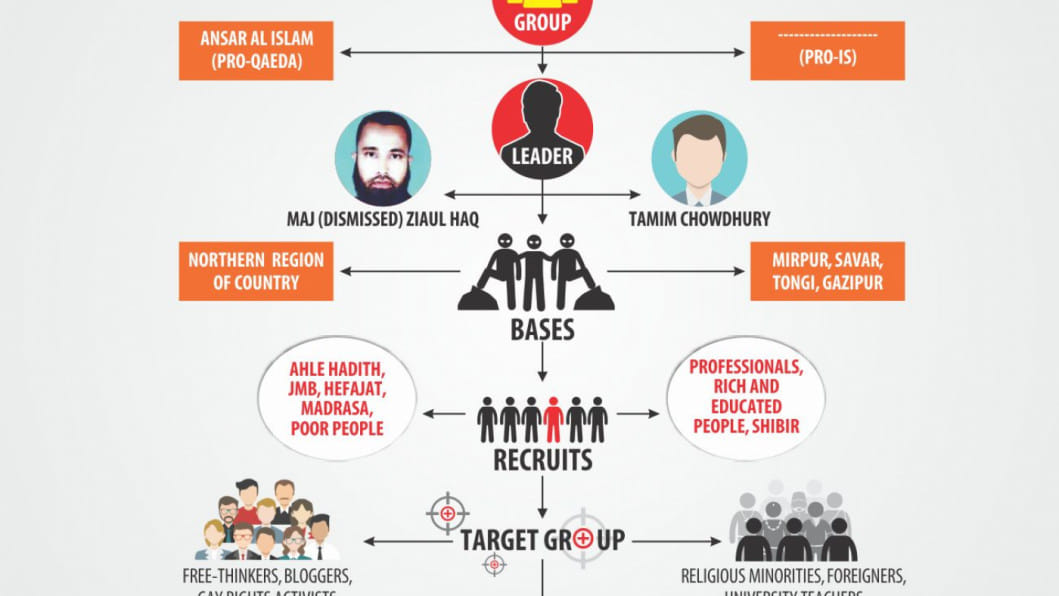Militants grow in silence

While the government was taking pride in containing militancy by cracking down on Jama'atul Mujahideen Bangladesh (JMB) over the last several years, two new radical Islamist groups have built up an extensive network that remained relatively unnoticed until late last year.
One group is leaning towards al-Qaeda while the other influenced by Islamic State (IS).
The pro-Qaeda outfit is called Ansar Al Islam. Major (dismissed) Syed M Ziaul Haq, who made headlines by trying to engineer a military coup in 2012, is its military commander.
Around 200 trained members are active in the country to execute the plans of Ziaul Haq, detectives say based on statements of some of its arrested members.
Ansar Al Islam was previously called Ansarullah Bangla Team.
As a rising militant outfit, Ansarullah wanted to launch al-Qaeda in Bangladesh (AQIB) like al-Qaeda in Indian Sub-Continent (AQIS). But the AQIS headquarters in Pakistan did not approve the idea and suggested Ansarullah be renamed Ansar Al Islam and work as the Bangladesh branch of AQIS.
This group began gaining strength in 2013-14 -- especially in northern regions. It recruits from JMB, Ahle Hadith, Hefazat-e Islam, different madrasas and financially vulnerable families.
The other group, which is leaning towards IS, is being led by a Bangladeshi-Canadian named Tamim Chowdhury, who identifies himself as Shaykh Abu Ibrahim Al-Hanif, according to the IS mouthpiece Dabiq. It recruits from physicians, engineers, technologists, architects and educated people. Its members are comparatively affluent.
Tamim, in the latest issue of Dabiq, claimed that a section of Shibir, the student front Jamaat-e-Islami, is also working for his group in Bangladesh.
Some of its arrested members include sons of a former Supreme Court judge, former military official, former bureaucrat and an adviser to a former caretaker government.

According to statements of the arrested members of this group, some of its militants are Syrian war returnees. About a hundred such militants, including women, are now fighting in Syria. Some others have died. The IS mouthpiece Dabiq has published an obituary for one such militant.
The IS-influenced group has two main wings -- the southern wing based in Mirpur and the northern in Gazipur. Its operational headquarters are in Savar and Tongi while its training centre is in Mirpur. Detectives are now trying to pinpoint these locations.
In the last 18 months, militants have killed 47 persons. Responsibility for 28 of these killings was reportedly claimed by so-called Islamic State (IS) and eight by Ansar Al Islam.
Analysing the pattern, it can be said that Ansar Al Islam mostly targets secularist writers or bloggers and gay rights activists. They pick victims who can be labelled as anti-Islam and as such way would not gain sympathy from common men.
Targets of the so-called IS includes a wide-spectrum of people -- Hindu, Christian, Buddhist or Bahá'í leaders, spiritual leaders or pirs, members of Shia sect, university teachers, religious convert and foreigner, among others.
Detectives also claim to have arrested about 150 members of the two organisations and recorded statements from about 50. Seven have been killed in “crossfire”.
These militants are mostly new and not necessarily JMB bred, according to well-placed police sources. They have developed own messaging software so that police could not intercept their communications through mobile phones or the internet.
These new breed of terrorists are efficient and highly educated and they maintain close contacts with international terrorist organisations.
“Pre-occupied with curbing the JMB activities, we failed to notice that the local pro-IS group was developing an extensive network. We had a glimpse of its full network in last November,” said a top detective official.
“Detectives have brought JMB under control. The IS-influenced group will also come under control. But it will take time,” he said, “Because they are more organised than any other militant groups -- dedicated, smart and suicidal. Before they embark on any operation, they have their last prayer and bid final farewell to their comrades. They assume that they would certainly die if they get arrested.”
Detectives claim to have foiled a number of big plans of the so-called IS and Ansar Al Islam. One such plan was attacking an embassy of a western country. Upon learning about this plan, the detectives recovered huge arms and ammunition capable of blowing up a big multi-storey building.
A detective official said it was the threat of the militants that prompted the police to restrict the Pahela Baishakh festivity.
Investigators learned that the militants have plans to attack important installations and persons. They had even planned to attack and occupy a private television channel and televise their messages for a while -- just to draw the attention of the world.
On May 22, Amir Hossain Amu, chief of the cabinet committee on law and order maintenance, told the press that JMB was directly involved in 25 recent killings, Ansarullah Bangla Team (renamed Ansar Al Islam) in eight and other militant groups in four.
Amu claimed no connection of IS was found with these killings.
As per his statements, all the killings reportedly claimed by the IS were actually done by the JMB. Home Minister Asaduzzaman Khan Kamal also said that there was no IS presence in the country and all the killings were targeted.
Detectives say it was pointless to argue whether there was IS in Bangladesh or not, as the threat of these militant groups was real. These groups would continue to gain strength unless the government adopts a new strategy to curb militancy.
Counter-Terrorism and Transnational Crime (CTTC) unit chief Monirul Islam said, “As the situation of militant organisations based in Iraq, Syria and Afghanistan has become fragile due to the global situation, they are now more interested in the sub-continent.”
Those who nurture the jihadi ideology were getting involved with these militant groups, he said. "Islamic State and al-Qaeda are releasing videos online. These are inspiring some people to join these militant groups.”
Monirul Islam pointed out that it would not be possible to completely uproot militants from the country in the current global situation. “But we are trying to contain it,” he said.
Zayadul Ahsan is a former chief reporter of The Daily Star and an expert on militancy issues.

 For all latest news, follow The Daily Star's Google News channel.
For all latest news, follow The Daily Star's Google News channel. 








Comments